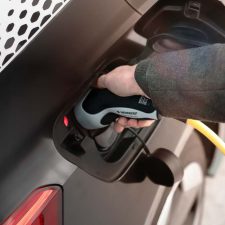The market for electric cars is growing rapidly, with EV’s becoming increasingly popular among drivers today. Not only are EV’s better for the environment – with zero emissions, but they are also much cheaper to run. EV statistics estimate that there are around 300,000 pure electric cars registered in the UK today.
Are you thinking of buying a used electric car, but you don’t know where to start?
Buying a used EV can be tricky when you don’t know what to look out for, and just like buying used fuel vehicles there are a lot of things you’ll want to think about beforehand. In this guide we will tell you everything that you need to consider when buying a used electric car, as well as some recommended models, dealerships, and a complete checklist of things to watch out for when buying your first used EV.
The best second-hand electric cars in the UK
When it comes to electric cars, there isn’t as much choice as fuel vehicles. Despite this, as more designs and brands are invented and become available on the market, the selection will be greater.
When buying a used electric car one of the first things you need to consider is how much you are willing to spend, as well as how much mileage you need.

UK government statistics and RAC black box data ‘reveal that the average UK journey is around 10 miles,’ which means a lower mileage electric car will be sufficient enough for most people. You can find more data and information on the RAC website here.
For instance, if you are looking to buy an EV to use as a starter car, providing an average mileage of around 160-180 miles, then models such as the Nissan Leaf – providing 168 miles, or the Volkswagen e-golf, Auto Express, used car awards winner 2021– providing 186 miles, might be a good option for you.
Alternatively, the Renault Zoe is also a very good choice. This EV will get you where you need to go and more, with newer models reaching up to range up to 245 miles on a single charge. This vehicle is also one of the cheapest used electric vehicles on the market! This makes the Renault Zoe a great starter EV for any first-time buyer to consider.
If neither of these models are for you, and you frequently travel long distances, you might want to consider:
Tesla’s Roadster – which offers an impressive range of up to 620 miles. If you’re looking for a premium model, then this might just be the EV for you, although even as a second-hand EV, this model will still be expensive.
Alternatively, Tesla’s Model S Long Range – provides a fantastic range of up to 375 miles. This EV was made for longer journeys and is a much cheaper alternative to the Roadster.

How much will a used electric car cost?
New EV’s can cost a fortune. Which is why buying a used electric car can save you lots of money. But how much does a used EV cost realistically?
Well that obviously depends on the make, model and your personal preference.
According to Auto Express, two of the cheapest electric cars to buy used in 2021 are the Renault Zoe, and older models of the Nissan Leaf. Both costing less than £10,000 to buy used. You can find out more information on their website here.
Some used car companies also offer finance options. If you don’t have the money to buy a used EV outright straight away, then a finance plan might be ideal for you.
Where can I buy a used electric car?
You can buy a used electric car from local second-hand showrooms that deal in EV’s. You can also check local adverts in newspapers and online selling sites, as well as looking out for personal sellers with advertisements in their car windows – while you’re out and about.
There are also a number of online retailers who now sell used electric cars including Auto Trader and AA. There is also buyacar.co.uk, who offer a range of cheap used electric cars in different price ranges. Their prices start from under £7,000 – or £150 per month on finance, making buyacar a fantastic place to find a used EV that is affordable.
Are used EV’s eligible for free Road Tax?
All pure electric vehicles are eligible for free Road Tax here in the UK, under the government’s incentives for zero emissions vehicles. This not only applies to new electric vehicles, but also extends to used EV’s too.
However, this does not mean that you should not tax your car, as per government and DVLA guidance, you are still permitted by law to register for Road Tax, even if it is free.

How long do EV batteries last?
Electric vehicles are powered by a lithium-ion battery, similar to the batteries used in mobile phones and laptops, only on a bigger scale. An EV battery is the most vital and valuable component, controlling the function of the vehicle and all of its technological features.
On average an EV battery’s longevity is predicted to be around 8-10 years, or around 100,000 miles. Of course, this all depends on your vehicle, and mileage – as an EV battery could potentially last 20 years if you only drove up to 5,000 miles a year.
Most EV manufacturers actually provide details of the battery’s life for each specific model they make.

The most obvious positive aspect of buying a used electric car, is the difference in cost.
Whether you decide to buy a used EV outright, or on finance, the cost will dramatically differ compared to buying a new EV. This will save you thousands of pounds, as well as enabling you to upgrade your car more often – should you choose to.
Another benefit is that all pure electric vehicles qualify for free Road Tax.
You might also be eligible for the wall-box grant, which offers EV owner’s part of the cost of the installation of an EV wall-box. However, this incentive is only available to owners of approved electric vehicles. The discount is offered by the Office for Zero Emission Vehicles (OZEV), to EV drivers with access to off-road parking.
The negatives of buying a used EV
Compared to buying a new electric vehicle, there are a couple of negative aspects to consider.
When buying a used EV – rather than a brand-new model, you will not be eligible for the plug-in car grant. The plug-in car grant is another subsidy, that provides drivers a discount of up to £2,500 off a new electric car, from the governments list of eligible models.
You will also need to consider any repair costs that may be required, when buying a used EV. Although, a bit of research and using the checklist we have provided for you below, will help save you time and money in this respect.

Used EV buyer’s checklist
Just like buying a used fuel vehicle, there are many things to consider when buying an electric car. Some of these might seem like common sense, however there are also other things to watch out for.
Things to consider when buying a used electric car include:
- The service history. When buying any used car, it is important to always check the service history, this will provide most of the information that you need in order to access how well the vehicle has been looked after, as well as any recurring faults the car may have had.
- Where you can get it serviced. Not all garages are equipped to service electric cars, so it might be a good idea to make sure one of your local garages provides services for EV’s beforehand.
- Think about where you can charge your EV and how much it will cost. Most people opt for charging at home, which is managed with a home charging cable. You can find out more information about charging your electric car at home here.
- Ask the seller if the price includes the battery. This might sound like an unusual question to ask. However, not all used electric cars are sold with the battery attached. You can also check if the car needs a new battery. This will of course depend on the age of the vehicle and mileage, and whether the battery has a history of faults.
- What is the warranty? It’s always a good idea to check if a warranty period is provided when you buy a used EV. Of course, this will depend on where you shop.
- Brakes and brake-pads. When buying a used car, it’s important to check that the brakes work properly, as well as the state of the brake pads. If the break-pads are worn and need changing, this will add extra costs to your EV.
- Unusual noises. During the test drive, it’s a good idea to listen out for any unusual noises indicating the car might require repairs. Talk to the seller about any concerns you may have before buying.

- Leaks and cracks. Inspecting the car with a torch for leaks and cracks might make you feel a little awkward. However, you will be glad you checked if you do find any.
- Cables and outlets. It’s good practice to check the condition of the cars charging outlets. It’s also important to ask if any charging cables are included with the price.
- It is also good practice to check: the lights, indicators, windscreen wipers, air con, heater, and that the windows wind up and down properly.
- You could also check for apps that allow smart charging – as well as energy providers, before you purchase a used EV.
- This final step is the most important of all! And that’s to watch the car while it charges.
Conclusion
There are numerous points to consider when thinking about buying a used electric car, such as: the make and model, mileage, and cost. The demand for zero-emissions vehicles is increasing rapidly, but new electric cars aren’t cheap to buy.
The good news is that used EV’s help to solve this problem, making electric cars much cheaper to own than ever before. And now that more EV’s are in circulation, there’s no time like the present to consider buying your first electric car.







